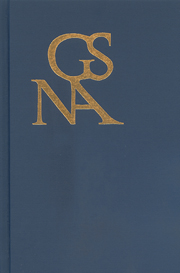Book contents
- Frontmatter
- Contents
- Special Section on Goethe's Lyric Poetry
- Introduction: New Approaches to Goethe's Lyric Poetry
- Intimacy, Morality, and the Inner Problematic of the Lyric
- Beyond the Poem: Strategies of Metapoetic Reflection in Goethe's Erster Weimarer Gedichtsammlung
- Meistersänger als Beruf: The Maieutics of Poetic Vocation in “Erklärung eines alten Holzschnittes …”
- Song or Narration?: Goethe's Mignon
- The Sucking Subject: Structural Ambiguities of Goethe's “Auf dem See” in Literary and Linguistic Perspective
- “Höhere Begattung,” “höhere Schönheit”: Goethe's Homoerotic Poem “Selige Sehnsucht”
- Poetry after Faust
- Forms of Knowledge/Knowledge of Forms: The Epistemology of Goethe's West-östlicher Divan and Cavellian Skepticism
- Im flüßgen Element bin und wieder schweifen: Development and Return in Goethe's Poetry and Hegel's Philosophy
- Goethe's Historical Particularism and the “Right Hand” of History: Early Modern State Building, Nobility, and the Feud in Götz von Berlichingen
- Where Are the Mountains?: Johann Jacob Bodmer and the “Pre-Kantian Sublime”
- The Politics of Aesthetic Humanism: Schiller's German Idea of Freedom
- Romanticism's Old German as Stepping-Stone to Goethe's World Literature
- Book Reviews
Intimacy, Morality, and the Inner Problematic of the Lyric
from Special Section on Goethe's Lyric Poetry
Published online by Cambridge University Press: 05 October 2013
- Frontmatter
- Contents
- Special Section on Goethe's Lyric Poetry
- Introduction: New Approaches to Goethe's Lyric Poetry
- Intimacy, Morality, and the Inner Problematic of the Lyric
- Beyond the Poem: Strategies of Metapoetic Reflection in Goethe's Erster Weimarer Gedichtsammlung
- Meistersänger als Beruf: The Maieutics of Poetic Vocation in “Erklärung eines alten Holzschnittes …”
- Song or Narration?: Goethe's Mignon
- The Sucking Subject: Structural Ambiguities of Goethe's “Auf dem See” in Literary and Linguistic Perspective
- “Höhere Begattung,” “höhere Schönheit”: Goethe's Homoerotic Poem “Selige Sehnsucht”
- Poetry after Faust
- Forms of Knowledge/Knowledge of Forms: The Epistemology of Goethe's West-östlicher Divan and Cavellian Skepticism
- Im flüßgen Element bin und wieder schweifen: Development and Return in Goethe's Poetry and Hegel's Philosophy
- Goethe's Historical Particularism and the “Right Hand” of History: Early Modern State Building, Nobility, and the Feud in Götz von Berlichingen
- Where Are the Mountains?: Johann Jacob Bodmer and the “Pre-Kantian Sublime”
- The Politics of Aesthetic Humanism: Schiller's German Idea of Freedom
- Romanticism's Old German as Stepping-Stone to Goethe's World Literature
- Book Reviews
Summary
Goethe's post-anacreontic poetry “fundamentally alter[ed] the nature of poetic writing, inaugurating a type of literary discourse that, from a European perspective, can be called the Romantic lyric.” Thus argues David Wellbery in “Idyllic and Lyric Intimacy” the introductory essay of The Specular Moment: Goethe's Early Lyric and the Beginnings of Romanticism Wellbery does not read the Romantic lyric in the poetological tradition it generated, a tradition that is “in essence tautological, drawing on, and reinforcing, the mythical values—‘nature,’ ‘force,’ ‘youth,’ ‘unmediated song’—the texts themselves set into circulation” (7); rather he approaches Goethe's early poetry as a particular discursive practice that produces the effects of which it speaks. A comparison of Goethe's “Maifest” with passages from Salomon Geßner's sentimental idylls reveals the “discursive mutations” the changes in the pragmatic, the fictional, the temporal, and the semantic structures that generate the “new enunciative modalities and strategies of reading” (11) associated with the Romantic lyric. While the comparison with Geßner focuses on particular changes in literary writing, the epochal significance Wellbery attributes to Goethe's poetry from the 1770s is not restricted to literary history; rather, Wellbery draws on Nietzsche, Michel Foucault, Friedrich Kittler, and Niklas Luhmann to recognize the broad social relevance of Goethe's writing technique. It is said to have changed “the field of intimate communications” and to have helped reorganize intimacy itself (see 10-11). Furthermore, the structure of the lyric that “crystallize[s] into the signature of a historical emergence” (3) around Goethe's poetry is not restricted to the Romantic period.
- Type
- Chapter
- Information
- Goethe Yearbook 20 , pp. 5 - 24Publisher: Boydell & BrewerPrint publication year: 2013

